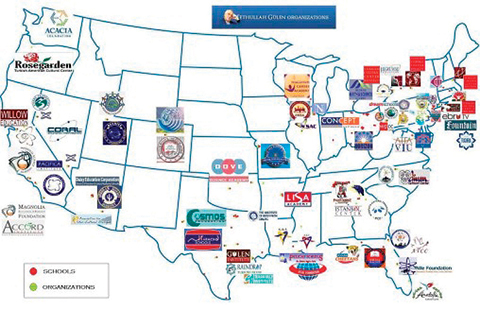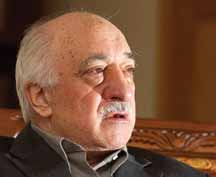What Is the Gülen Movement?
Over the last twenty years there has been a movement in schools that has changed the way many children are educated—charter schools. Charter schools are public schools, Kindergarten through 12th grade, that receive public money, but are not subject to the same rules that apply to other public schools. In return, charter schools are accountable to achieve certain goals that are outlined in the school charter.
The goal of a charter school is to provide a better education than can be received though the normal public schools. Some of the schools specialize in certain fields; i.e., mathematics and the sciences. Attendance at charter schools is voluntary and the schools are not allowed to charge tuition. In most cases, the charter schools are doing well—59% of the schools have a waiting list to enroll.1
Within the charter school system, though, there is a danger. There is a group of charter schools that may be teaching more than ABC’s. They have innocuous names like Chicago Math and Science Academy and Pioneer Charter School of Science. Currently, they are educating as many as 35,000 students in 100 publicly funded schools and make up the largest charter school network in the United States. They promote an Islamic agenda, but receive government money, unlike other religious schools in the United States. These are the schools that are part of what is called Fethullah Gülen Community (FGC), also known as “the Gülen Movement.”

Over the past 10 years, the schools have imported thousands of Turkish educators to work in the schools, most of them with ties to a Turkish Muslim named Fethullah Gülen, who lives in a small Pennsylvania town called Saylorsburg. Gülen is described by his followers as a moderate Muslim and has been called “contemporary Islam’s Billy Graham.”2
Who is Fethullah Gülen?
 Fethullah Gülen is a Turkish preacher who has started a worldwide network of Muslims to take the principles of Islam and move the religion into the modern world. He was born in 1938 in a village in eastern Turkey. His father was an Imam, and from him, Gülen learned the principles of Islam.
Fethullah Gülen is a Turkish preacher who has started a worldwide network of Muslims to take the principles of Islam and move the religion into the modern world. He was born in 1938 in a village in eastern Turkey. His father was an Imam, and from him, Gülen learned the principles of Islam.
Gülen’s beliefs are connected to Sufism, a mystical form of Islam. He became an Imam in his own right in 1957 when he was appointed to a mosque in Edirne, Turkey, near the Bulgarian border. It was there he came to learn the teachings of Said-i Nursi (1876-1960), a politically active Kurdish preacher. Nursi taught that Muslims should not reject modernity, but engage with it. Gülen put Nursi’s ideas into practice when he was transferred to a mosque in Izmir in 1966. (Izmir is the present-day name for Smyrna, one of the Seven Churches Christ wrote to in Revelation 2.) From this pro-Western base, Gülen started a network of student boarding-houses known as “lighthouses.”
It was in Izmir that Gülen applied Nursi’s teaching to create a network of private schools, residences and later universities and turn them into centers of excellence promoting a modern, Islam-based ethical framework.3 From this base in Turkey, Gülen expanded his network into countries that make up the former Soviet Union, the Balkans and finally the West. He started to make inroads into the secular world in earnest after he moved to the United States in 1997.
Once in the United States, Gülen applied for permanent residency, which was denied. The Department of Homeland Security characterized Gülen as neither an expert in the field of education nor an educator but rather as “the leader of a large and influential religious and political movement with immense commercial holdings.”4 (His formal education is limited to five years of elementary school.)5 In their written denial, U.S. attorneys for the Department of Homeland Security also stated a suspicion about CIA involvement in funding the Gülen Movement’s global projects. His visa was approved after his appeal, with the help of several CIA agents. Gülen moved to South-eastern Pennsylvania and established his network of schools in the United States.
Gülen’s Educational Philosophy and Gülen Schools
A religious-based educational philosophy is one of Gülen’s primary themes; he has very specific notions about the way in which children should be instructed in schools, some of which are described in “The Educational Philosophy of Fethullah Gülen and Its Application in South Africa.”
The Gülen charter schools are founded and operated by Turkish immigrants (male scientists and businessmen) who can often be tied to the American Gülenist organizations. An unusually strong pattern of similarities in their establishment and operation indicates that these U.S. schools are likely tied into a larger network of international Gülen schools. However, the operators of the schools are extremely reluctant to discuss Gülen, the Gülen Movement, or Gülen’s approach to education. Sometimes they will admit that the schools are “Gülen-inspired.”
The schools’ connection to Gülen’s educational philosophy is never volunteered to the public; it is not mentioned on the web sites or in the charter school petitions. In other countries, the Gülen schools are tuition-based, but as charter schools, the U.S. Gülen schools receive public state and federal funds. American news organizations have done little to inform the public about the Gülen Movement, its schools, or any deeper significance or associated controversies. To date, only one news story has been produced by the mainstream press, USA Today’s “Objectives of charter schools with Turkish connections questioned.”6
Broad public awareness about the Gülen charter schools has not yet occurred. One reason this national phenomenon has gone unnoticed for so long is because charter school authorization is fragmented and oversight is local and inadequate. It has taken awhile for anyone to become aware that there is a multi-district, multi-state charter school pattern in operation.
Each year that goes by, more and more U.S. tax dollars have become involved with the establishment and support of these Gülen charter schools with very little public discussion about using taxes to fund them.
Taken individually, the Gülenist schools seem quite promising and their oddities are not noticeable. However, despite the schools and school clusters claiming to have no, or minimal, affiliation with one another, they have extremely unusual similarities, which they even share with the international Gülen schools. The characteristics of these schools will include most of the following:
• Emphasis on math and science; yet little experimental science.
• High scores on standardized tests, even in cases of very challenging demographics.
• Chronic problems with special education compliance.
• High teacher turnover; teachers, administrators disappear and appear mysteriously.
• High usage of H-1B Visas to fill staffing needs.7
• Turkish cultural activities such as Turkish clubs, elaborately costumed student participation in regional “Turkish Olympiads” and class trips to Anatolian/Turkish festivals.
• School-sponsored trips to Turkey, usually disguised as “International” or “European” trips (scan the photo galleries on the school web sites).
Even with the large number of foreign-born Islamic teachers and administrators in the Gülen school network, why should people be concerned about these charter schools? One reason is given by Bayram Balci, a Turkish scholar with the Institut Français d’Etudes sur l’Asie Centrale in Grenoble, France. Dr. Balci states that Gülen schools have been established through-out the world to bring about a universal caliphate ruled by Islamic law.8 Graham Fuller, a former CIA agent and the author of several books on political Islam, says that Gülen is leading “one of the most important movements in the Muslim world today.”9
In a sermon that was aired on Turkish television, Gülen said:
You must move in the arteries of the system without anyone noticing your existence until you reach all the power centers…until the conditions are ripe, they [the followers] must continue like this. If they do something prematurely, the world will crush our heads, and Muslims will suffer everywhere, like in the tragedies in Algeria, like in 1982 [in] Syria…like in the yearly disasters and tragedies in Egypt. The time is not yet right. You must wait for the time when you are complete and conditions are ripe, until we can shoulder the entire world and carry it…You must wait until such time as you have gotten all the state power, until you have brought to your side all the power of the constitutional institutions in Turkey…Until that time, any step taken would be too early—like breaking an egg without waiting the full forty days for it to hatch. It would be like killing the chick inside. The work to be done is [in] confronting the world. Now, I have expressed my feelings and thoughts to you all—in confidence …trusting your loyalty and secrecy. I know that when you leave here—[just] as you discard your empty juice boxes, you must discard the thoughts and the feelings that I expressed here.10
Gülen does not approve of the title, “Gülen Movement.” Instead he refers to it as a “volunteers’ (hizmet) movement.” Hizmet is one of the highest duties in Islam, implying both a religious and national service. Gülen’s community of followers is known as the cemaat. He is referred to as their hocaefendi (master lord).
Several countries have outlawed the establishment of Gülen schools, including Russia and Uzbekistan. Even the Netherlands, a nation that embraces “pluralism” and “tolerance,” has opted to cut funding to the Gülen schools because of its aggressive promotion of Islam. One of these charter schools—Tarek ibn Zayed Academy (TiZA) in Minnesota—is so radically Islamic and subversive in nature that the Minnesota Department of Education issued two citations against it and the American Civil Liberties Union (ACLU) is suing it.11
Equally disturbing is the encroachment of the Gülen Movement into American politics. The FGC is known to have supported the election campaigns of various U.S. politicians. These same politicians also sought the blessing of the Gülen Movement by appearing at FGC events. For instance, Hillary Clinton is known to have attended FGC events in the U.S., including a September 2007 Ramadan breakfast organized by the Gülenist Turkish Cultural Center in New York City.
Dalia Mogahed is a Senior Analyst and Executive Director at the Gallup Center for Muslim Studies. She is also an advisor on Islamic Affairs to President Barack Obama and a strong supporter of the Gülen Movement. When asked about the movement’s hidden agenda, Mogahed was quoted as saying that she does not attach any importance to such allegations: “It [the Gülen Movement] has moved beyond Turkey in its very benevolent projects and it serves people from all around the world of all backgrounds, but it is still made up mostly of Turks. That is what I feel is in need of expanding,” she said.12
One can draw parallels between the United States and the Northern Kingdom written about in the Book of Hosea. Both had advanced technologies and unparalleled prosperity. Also, they both had evidence of moral decay: they rejected God throughout the culture. Hosea then chronicles the Northern Kingdom’s suffering from God’s judgment: he gave the Kingdom over to Assyria, a country now made up of Iraq, Syria, and parts of Iran, Egypt, and Turkey. All of these countries are now predominantly Muslim.
Is God giving the United States over to modern-day “Assyrians”? Imagine a cityscape in which the minaret, not the church steeple, dominates. Many fear that the “Ground Zero Mosque” may be the start of just such a skyline. After the morning of September 11, 2001, Americans remain perplexed about the faith of Islam. How could a religion like Islam make young men decide to fly airplanes into buildings? How could such a view of the world produce such zealots? Such world-views are complex and confusing to the Western mind. Schools such as those in the Gülen Movement promote a skewed view of the world and expose young minds to the dangers of Islam.
Americans should ask how the Gülen Movement has managed to establish such inroads into the American education system. It is a movement that needs to have oversight and must be made to conform to the laws of the United States, just as any other education institution that receives public funding.
Danene Vincent, Silver Medallion holder, did the original research for this article.
Notes:
- http://www.edreform.com/Archive/?Annual_Survey_of_Americas_Charter_Schools_2008. Retrieved September 19, 2009.
- “Objectives of charter schools with Turkish ties questioned”: http://www.usatoday.com/news/education/2010-08-17-turkishfinal17_CV_N.htm.
- New York Times. (2008, January 8). TURKEY: Fethullah Gülen profile
- Fethullah Gülen’s Grand Ambition, The Middle East Quarterly, Winter 2009, http://www.meforum.org/2045/fethullah-gulens-grand-ambition#ftn51.
- Ibid.
- Greg Toppo (August 17, 2010), http://www.usatoday.com/news/education/2010-08-17-turkishfinal17_CV_N.htm.
- The H-1B visa allows U.S. employers to temporarily employ foreign workers in specialty occupations.
- Fethullah Gülen’s Missionary Schools in Central Asia and their Role in the Spreading of Turkism and Islam, Religion, State & Society, Vol. 31, No. 2, 2003, ISSN 0963-7494 print/ISSN 1465-3975 online/03/020151-27
- “Objectives of charter schools with Turkish ties questioned”: http://www.usatoday.com/news/education/2010-08-17-turkishfinal17_CV_N.htm.
- World’s “Most Dangerous Islamist” Alive, Well, and Living in Pennsylvania, Paul Williams, Ph.D., April 7, 2010, Family Security Matters.
- Ibid.
- Williams, Paul. “White House Muslim Advisor Supports Islamist Gülen Movement.” www.familysecuritymatters.org. Family Security Matters, 15 Jun. 2010. Web. 15 Aug. 2010. http://www.familysecuritymatters.org/publications/id.6467/pub_detail.asp





